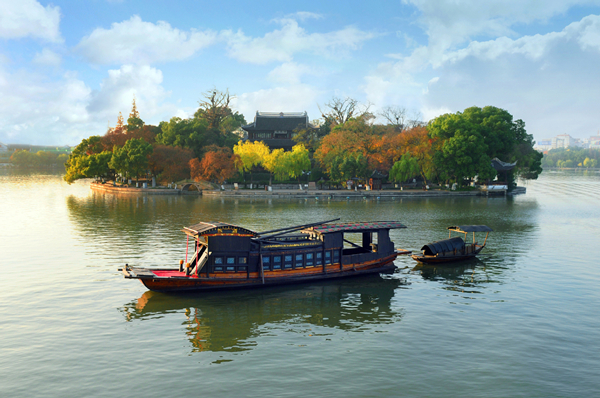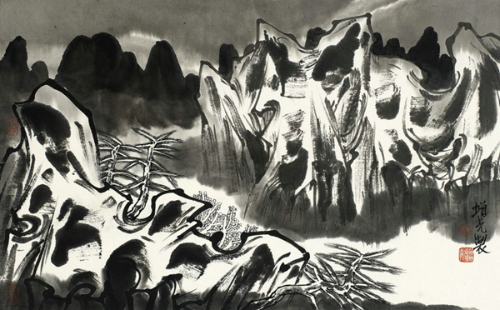Red Boat spirit still afloat a century on

The Red Boat on Nanhu Lake in Zhejiang province's Jiaxing is an icon in the history of the Communist Party of China. [Photo provided to China Daily]
On Nanhu Lake in Zhejiang province's Jiaxing rests one of China's most famous water vessels-the Red Boat.
Every day, large numbers of visitors line up to pay homage to the historical boat, which honors the conclusion of the first National Congress of the Communist Party of China in 1921.
"More tourists are expected to go sightseeing around Nanhu Lake as China races toward July 2021, which marks the 100th anniversary of the CPC's founding," says Zhang Yi, who has worked as a commentator at the Nanhu Revolutionary Memorial Hall for more than 10 years.
Zhang applied for the job as a commentator at the Nanhu Lake scenic area after graduating from university in 2009.
"My parents told me stories about the Red Boat when I was a kid, which aroused my aspiration to be a commentator at the memorial," Zhang explains.
Zhang's mother, Xu Jinqiao, who also took a job as a commentator with the memorial when she was 26 and is now retired, says, "Being a commentator has high skill requirements, especially knowledge."
Xu was a Jiaxing Peking Opera Troupe actress before coming to Nanhu Lake. She applied for a job as a commentator at the memorial in 1984, when the Peking Opera Troupe was dissolved.
Xu made full use of her artistic talent and rewrote the material in song form to increase the appeal of her commentary.
Zhang Yi's father, Zhang Xinzhi, who also previously worked at the memorial, was involved with protecting and repairing the Red Boat for over 30 years before retiring in 2018.
The Red Boat needs to be refurbished every year, since it was sodden with water for a long time, Zhang Xinzhi says.
He explains that the difficulty in repairing the vessel rests in making it appear as old as it is, despite the fixes. It usually took him more than 50 days a year to find suitable wood, disassemble the boat, clean its components and mend any damage.
The Chinese Museums Association recently upgraded the Nanhu Revolutionary Memorial Hall to a first-class museum, local media reported on Jan 4.
The museum established in 1959 manages the site of the first National Congress of the CPC.
To better protect and use Nanhu Lake, the memorial was given approval to establish a new museum, which opened in 2011 to mark the 90th anniversary of the CPC's founding.
It has since continued to expand its collection through donations, solicitations and acquisitions. It houses over 10,000 artifacts, including revolutionary relics, precious documents, valuable paintings and calligraphy works.
To the CPC's over 91 million members, Nanhu Lake is far more than just a scenic attraction-it's the physical birthplace of the Party.
For this year's 100th anniversary of the CPC's founding, the memorial has organized a group of commentators to carry out presentations featuring the Party's history and spirit in local communities, schools and companies, says memorial curator Zhang Xianyi.
In 1921, the first CPC National Congress reconvened on a red boat on the lake after being interrupted by authorities in Shanghai's French concession. It was aboard this vessel that the 13 delegates announced the official founding of the CPC, with the Red Boat becoming a symbol of the courageous and pioneering spirit of the early leaders.
The meeting encapsulated China's revolutionary spirit.
In October 2017, the CPC's newly elected top leadership, headed by General Secretary Xi Jinping, visited the site, where they vowed to stay true to the Party's original aspirations and serve the people.
It was Xi's first domestic trip after the 19th CPC National Congress. The congress elected a new CPC Central Committee and drew up a blueprint for the country's development in the coming decades.
"We're striving to publicize the history of the CPC so that the Red Boat spirit can play a vital role in the country's future development," says Zhang Xianyi.
Cai Jingwen contributed to the story.





 play
play